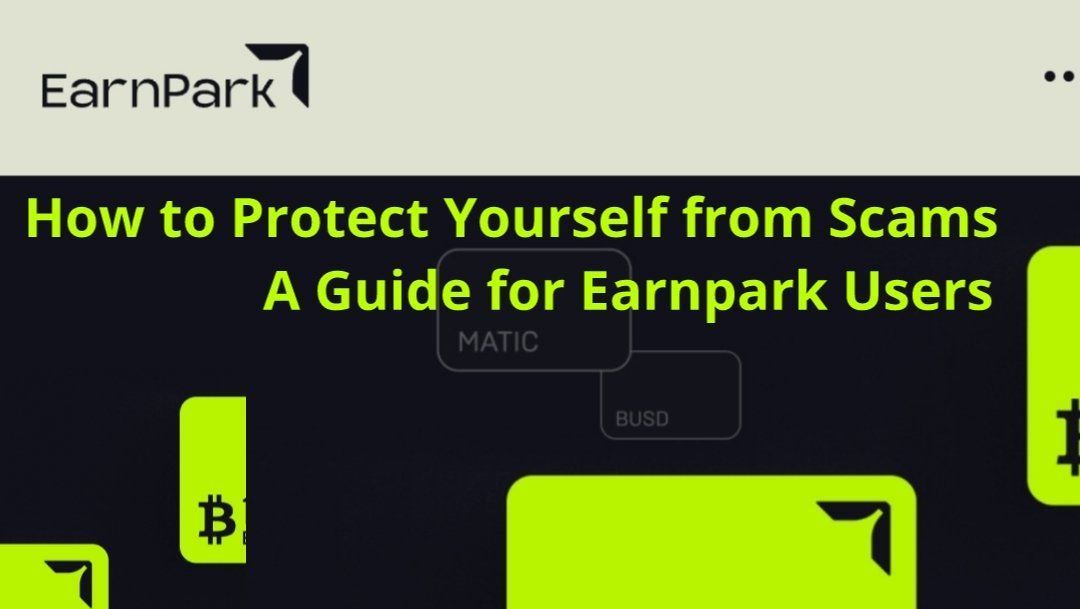How to Protect Yourself from Scams: A Guide for Earnpark Users

In today's digital age, where online interactions have become commonplace, it is crucial to remain vigilant against scams. Whether you're a user of the EarnPark platform or engaging in any online activity, following some simple rules can help protect yourself from falling victim to fraudsters. By being aware of potential risks and taking necessary precautions, you can safeguard your personal and financial information. Here are some essential tips from EarnPark to prevent scams.
1. Beware of Suspicious Messages & Content
Exercise caution when encountering suspicious messages or content online. Whether it's through private messages, emails, or social media, scammers may attempt to deceive you. Always be skeptical and scrutinize any communication that seems unusual or raises doubts. If you receive unsolicited private messages claiming to be from admins, remember that EarnPark administrators never send private messages. Report any suspicious activity to the platform's support team.
2. Keep Your Login and Password Information Secure
Never share your EarnPark account login or password information with anyone. Legitimate platforms will never ask for your password or other security codes. Be cautious of individuals or entities requesting such sensitive information. Safeguard your login credentials and change your password regularly to enhance security.
3. Avoid Sharing Account Information with Others
Your EarnPark account is personal, and you should never disclose its information to other users. Sharing account details can expose you to various risks, including unauthorized access and potential scams. Be mindful of whom you trust online and maintain the confidentiality of your account.
4. Exercise Caution with Suspicious Emails and Links
When it comes to email communications, exercise caution before clicking on any links, especially from untrusted sources. Scammers often use deceptive emails to trick unsuspecting individuals into revealing personal information or downloading malware onto their devices. Verify the sender's email address and double-check its authenticity. If in doubt, refrain from clicking on any links or downloading attachments.
5. Safeguard Your Personal Information
Maintain a strict policy of not sharing personal information with unknown individuals. Whether someone contacts you over the phone, via email, or through social media, refrain from disclosing sensitive details such as private keys, banking and credit card information, birthdate, and social security or social insurance numbers. Genuine organizations will never ask for such information via unsolicited channels.
6. Be Wary of Advance Payment Requests
Scammers often entice their targets with promises of financial gains or winnings, only to demand advance payments for taxes or fees. Be cautious of any such requests, as they are likely attempts to defraud you. Legitimate transactions and opportunities rarely require upfront payments. Maintain a healthy skepticism and consult trusted sources before engaging in any financial transactions.
7. Take Time to Evaluate Attractive Offers
If you receive an exceptionally attractive offer but have doubts about its legitimacy, take some time to evaluate it thoroughly. Scammers often use tactics to create a sense of urgency, pressuring victims into making hasty decisions. Avoid falling into this trap by discussing the offer with a family member, friend, or financial advisor. Seek advice from those you trust before proceeding with any financial commitments.
8. Avoid Installing Third-Party Apps
Exercise caution when installing third-party apps, especially those that may compromise the security of your device or provide scammers with unauthorized access. Apps like Anydesk, which offer remote access, can potentially expose your personal information to malicious actors. Stick to trusted applications and verify the reputation and security of any software before installation.
9. Report Suspicious Emails and Seek Support
If you receive an email claiming that you have a significant sum of money locked in a blockchain or on EarnPark, and need to pay to unlock it, be aware that it is likely a scam. Report such emails to EarnPark's support team immediately and seek assistance. They have dedicated professionals who can investigate and take appropriate action. By reporting scams, you not only protect yourself but also help safeguard the community from potential fraudulent activities.
10. Stay Informed and Educate Yourself
Scammers are constantly evolving their tactics, making it essential to stay informed about the latest scamming techniques. Regularly update your knowledge on common scamming methods, new online threats, and best practices for online security. EarnPark may provide educational resources and articles on their platform or website to help users stay vigilant. Take advantage of these resources and empower yourself with knowledge to recognize and avoid scams effectively.
In conclusion, protecting yourself from scams, even on the EarnPark platform, requires vigilance and adherence to basic security practices. Following guidelines, such as being cautious of suspicious messages, avoiding sharing sensitive information, and not clicking on untrusted links, you can significantly reduce the risk of falling victim to scams. Remember, if something seems too good to be true or raises doubts, take the time to evaluate and consult with trusted individuals. Stay informed, stay cautious, and help create a safer online environment for all EarnPark users.
Source: EarnPark Docs
68 comments